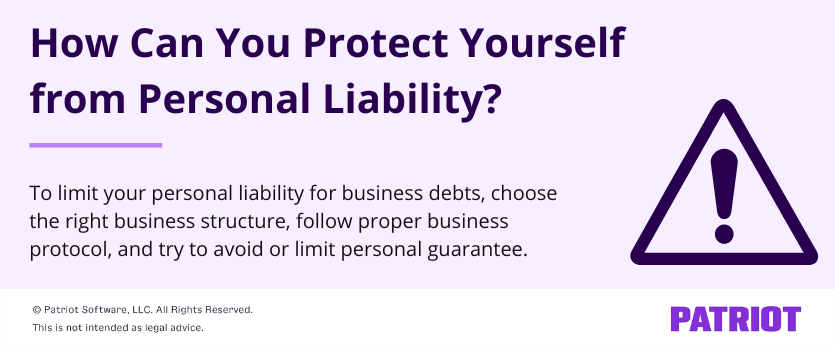The average small business owner is roughly $195,000 in debt. Imagine paying that amount from your pocket, and if you can’t, how it’ll reflect on your credit report.
Daunting! Especially if you already have personal financial obligations like credit card debt, student loans, or payday loans to pay off.
So, how does liability for debts work? Are you personally liable for your business debts? It depends on your business structure and other circumstances, which we’ll discuss in this article.
Types of business structures and personal liability for debts
Business structures are of several types, each with its benefits and drawbacks. But when it comes to protecting your assets from business debts, there are some clear winners: LLCs and corporations.
Here’s an overview of the type of structures that make you liable and the one that limits your responsibility.
Business structures that make you liable
You are personally liable for business debts if you structure as a sole proprietorship, general partnership, or limited partnership.
If your business falls under the sole proprietorship structure, you and your business are legally the same. So if you incur business debts, the creditors can legally come after you for payment.
In the case of a general partnership, the matter is the same. Each partner owes 100% of the debt the business fails to pay. So, if your partner bails on you, and you have the assets that will suffice the debt, the creditors can come after you for the full amount.
If one of the partners is a limited partner, and the other is a general partner, only the latter assumes unlimited liability for the business debts. Legally, the limited partner has limited liability up to the amount of their investment.
Business structures that guarantee limited liability
When you establish your business as an LLC or a corporation, it is a separate entity from you, the owner, in the eyes of the law.
Hence, your business debt is also separate from your finances. However, there are some circumstances where these structures cannot save your assets.
These situations include:
- Providing personal guarantee
- Piercing corporate veil
- Signing a contract or agreement using only your name
- Non-compliance with laws and regulations
1. Providing personal guarantee
You may be liable for the business debt if you provide a personal guarantee. An,d it’s a risk that comes with most business loans, including term loans, business lines of credit, and business credit cards. Even unsecured business loans may require a personal guarantee.
2. Piercing corporate veil
If your business is an LLC or a corporation, but you don’t follow the rules that come with the structure, it can lead to the “piercing of the corporate veil.” This is a legal term when a court doesn’t care that a business is separate from its owner(s).
In other words, the court will treat your business and you as one, and you may be held liable for the business debts.
The corporate veil may get pierced if you:
- Don’t hold regular meetings and keep proper corporate records.
- Engage in fraudulent or unethical behavior.
- Use business funds for personal expenses.
3. Signing a contract or agreement using only your name
You won’t be able to keep your limited liability for debts owed under a contract you signed using only your name.
The business’s name and relationship to it must be in the contract to show that your business is the debtor, not you.
4. Non-compliance with laws and regulations
Suppose you fail to comply with laws and regulations related to your business, such as tax or employment laws. In that case, you may be held personally liable for any resulting debts or penalties.
For example, if you don’t send the withholding taxes to the state and the IRS, you may be liable for the tax debts.
How can you protect yourself from personal liability?
A thriving company with a positive cash flow and fewer debts results from careful planning and management. Without it, you’ll risk ruining your business goals and your personal finances.
Here are the three best ways to limit your personal liability for business debts.

1. Choose the right business structure
You should choose a structure that complements your business function.
For example, if you’re starting out, a sole proprietorship is a good structure as you have a low level of risk and liability. It is the simplest and most cost-effective business structure and offers complete control and flexibility.
However, if your business is booming and you’re taking on more risk through greater contracts and bigger loans, it’s best to change sole proprietorship to LLC or a corporation to limit your liability.
2. Follow proper business protocols
Suppose you’ve structured your business in a way that shows it to be a separate entity. In that case, you need to maintain your business that way.
You can avoid getting your corporate veil pierced and exposing your assets by keeping separate financial records, holding regular meetings, and following other corporate formalities.
3. Try to avoid or limit personal guarantee
You can get a business loan or business credit card without a personal guarantee—but you’ll likely have to appease the lender in another way.
For instance, it may be possible to avoid a personal guarantee by offering a larger deposit or a letter of credit. You can also talk lenders into a limited personal guarantee that attaches only to certain assets or lifts after a certain period.
How to handle personal liability for business debts
There are several steps you can take to get out of business debt. However, if you fail to manage the debt and you are personally liable for the dues, here’s what you should do:
Assess your options: Several debt relief options can help you lower your obligation or restructure the repayment to make it more manageable.
These options include debt settlement, debt management, a payday loan consolidation program, and more.
Make a plan: Once you have assessed your options and chosen the one that suits your needs, make a plan to implement the option successfully.
This may include setting a budget to prioritize debt repayment, negotiating with creditors to reduce or restructure debts, or seeking legal protection through bankruptcy or insolvency.
Get professional help: If you’re unsure how to navigate the newfound financial obligation, it’s best to consult a lawyer, accountant, or financial advisor.
Take steps to prevent future personal liability: Maintain the right business structure and properly manage your day-to-day business functions. It’ll help you lower the chance of becoming personally liable for business debts in the future.
The bottom line
Personal liability for business debts can cause significant financial stress, especially if you’re already struggling with debt like credit card debt, student loans, personal loans, or payday loans.
So, it’s best to take the necessary steps early and separate your personal and business finances. And if you find your personal finances caught up in your business debts, follow the steps mentioned above.
These views are made solely by the author.
This is not intended as legal advice; for more information, please click here.


